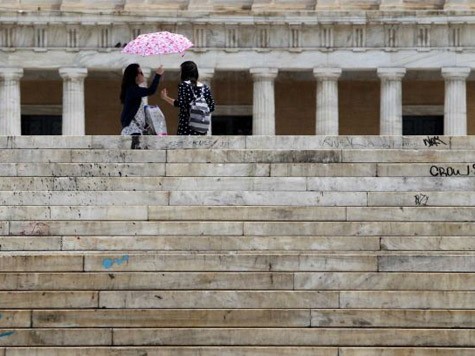
This morning’s key headlines from GenerationalDynamics.com.
- Central Asian nations harden mutual boundaries as Nato pulls out
- Europe raises expulsion threat level against Greece
- Germany’s Merkel expects to clash openly with France’s Hollande
- Anti-German sentiment in Greece deters tourists
- Suicide bomber creates scene of massive carnage in Yemen
Central Asian nations harden mutual boundaries as Nato pulls out
As Nato continues with its planned pullout of forces from Afghanistan in 2014, central Asian countries are fortifying their boundaries, sometimes with the help of the U.S., who wish to prevent central Asian insurgents from returning to their homelands. American forces are helping Kyrgyzstan fortify its southern border with Tajikistan. Russia is raising concerns that the U.S. is planning to establish a permanent American troop presence, but seems to be willing to take America’s word that there is no such plan. As all five central Asian republics prepare for increasing security challenges emanating from Afghanistan, their natural inclination has been to strengthen border security. Both the Pentagon and the Kremlin have found roles for themselves in the interim, and have managed not to encroach too egregiously on each other’s short-term interests. Whether their interests in strengthening the region’s internal security remain aligned after the NATO withdrawal is an open question. Jamestown
Europe raises expulsion threat level against Greece
Since Greece’s May 6 election failed to produce a viable government, Greece is heading to the polls again on June 17, where the winner is now expected to the Coalition of the Radical Left (SYRIZA), led by Alexis Tsipras, 38, who is promising to end all austerity measures and return to free spending. He claims that Europeans are only bluffing when they say that they will no longer help Greece, since they have no choice. And indeed, French and German banks are heavily invested in toxic Greek bonds, and will have to be bailed out themselves unless Greece continues to be bailed out. Although the official position of the eurozone countries is that they’re not talking about a Greek exit from the eurozone, leaks from a closed door meeting of Finance Ministers last week in Brussels indicate that they’re very close to doing just that. “If we now held a secret vote about Greece staying in the euro zone,” Euro Group Chairman Jean-Claude Juncker warned his Greek colleague last week, “there would be an overwhelming majority against it.” Indeed, they blame Greece for being the cause of Europe’s financial crisis (forgetting many things, such as Spain’s huge real estate bubble that’s now collapsing), and are not willing to bail out Greece any more unless the austerity commitments are followed. Spiegel
Germany’s Merkel expects to clash openly with France’s Hollande
German Chancellor Angela Merkel said she won’t shy away from clashing with French President François Hollande at a European Union summit on Wednesday that’s the next attempt to stem the debt crisis. Hollande wants the entire eurozone to bail out France’s banks with “eurobonds,” which would be bonds guaranteed jointly by all 17 eurozone nations. Merkel opposes joint debt issuance, saying the differences in bond yields [interest rates] between euro countries are incentives for weaker nations to overhaul their economies and boost competitiveness. Bloomberg
Anti-German sentiment in Greece deters tourists
Greece’s tourism industry has been hit hard by the political turmoil following the May 6 election, and the growing speculation about Greece leaving the euro zone, with bookings down 50%. Germans are particularly deterred by shocking news footing showing demonstrators in Athens burning German flags or carrying placards depicting Merkel in a Nazi uniform. However, tourism should pick up again if Greece leaves the euro, since the new Greek drachma currency is expected to be sharply depreciated against the euro. Spiegel
Suicide bomber creates scene of massive carnage in Yemen
A Yemeni soldier in Sanaa, the capital of Yemen, detonated a bomb hidden in his military uniform during a rehearsal for a military parade on Monday, creating mass carnage, with 96 dead and hundreds wounded, in one of the deadliest attacks in the capital in years. The attack is thought to have been perpetrated by Al-Qaeda on the Arabian Peninsula (AQAP), whose forces in southern Yemen have been under attack by Yemen’s armed forces, aided by American special forces. AP

COMMENTS
Please let us know if you're having issues with commenting.